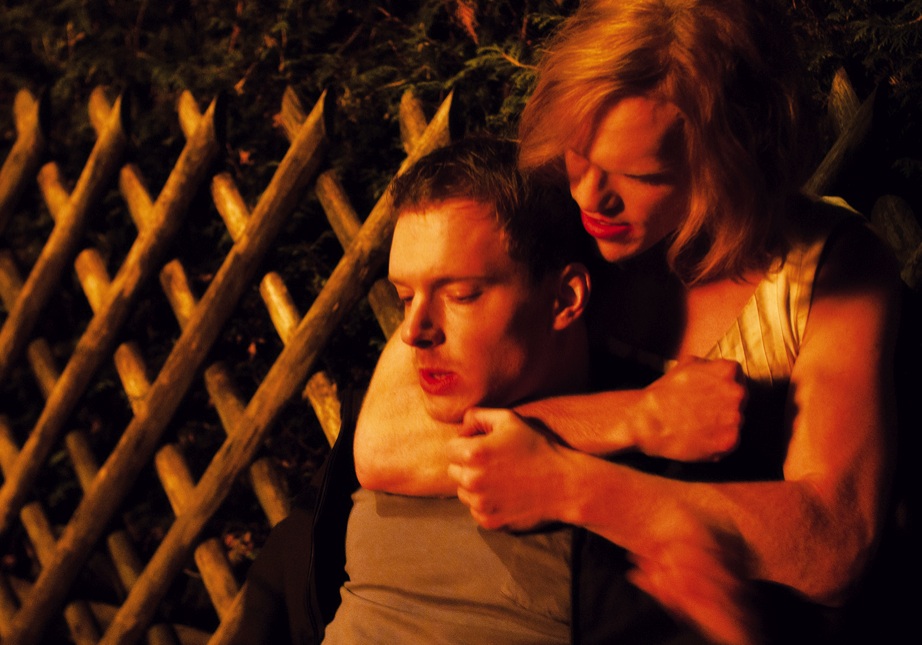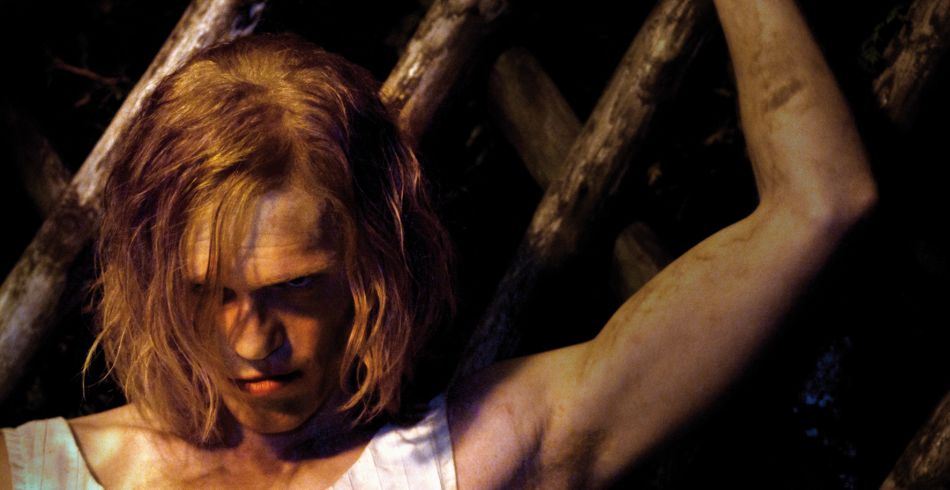Well-made and weird, writer-director Till Kleinert’s German flick Der Samurai is one of those films that are hard to define, precisely because of its uniquely bizarre storyline and multiple stylistic infusions. Reminiscent of a cross between Kill Bill and Silence of the Lambs but with a queer sensibility, Der Samurai is everything a horror fan could want, and more. Infused with elements of art-house camp, refined psychological suspense, and schlocky B-movie slasher, Der Samurai is not only a morbidly bizarre queer thriller, but a beautifully violent allegory about the struggle with one’s sexuality, and how the repression of such carnal urges can become altogether consuming. Making its international premiere at New York City’s Tribeca Film Festival, Der Samurai is a rarity within the horror scene—inducing that pleasurable sense of not knowing how the film will transpire, yet being fully aware that the filmmaker knows exactly what he’s doing.

Meet Jakob (Michel Diercks), a straight-laced young cop in a small town whose main task on the force seems to be dissuading a wolf that’s been scaring the local population. In an attempt to keep the animal at bay, this still wet-behind-the-ears officer ventures into the outlying woods every night; hanging bags of raw meat from the branches. This alone speaks volumes of Jakob’s character: for instead of confronting and eliminating any adversities, he would rather choose to repress them. Graced with an impressively bold use of contrasting color schemes, the opening shots of Jakob venturing out into the woods immediately establishes a nightmarishly picturesque atmosphere; a gothic dream-like tone weaved with elements of fairy-tale and horror that subliminally foreshadows the ominously surreal mood of the film—for the wolves aren’t the only ones lurking in the woods.
“To me, the exploration of the unknown almost always leads to a positive outcome, even if it involves destruction along the way.”
It isn’t long before Jakob receives a mysterious package addressed to the “Lone Wolf”, followed by a cryptic phone call from the package’s true owner, who instructs Jakob to deliver said package into the woods. Upon arrival, Jakob comes across a lithe man who happens to be squatting in front of a mirror applying lipstick. With wildly unkempt blonde hair and an intensely feral stare, the ‘samurai’ locks eyes with Jakob—and there’s an instant homoerotic attraction between the two that soon leads to a bizarre, bloody, and psycho-sexually charged cat and mouse game. Adorned in an elegantly flowing, well-fitted white dress, the samurai wreaks fatal havoc upon the local townspeople; wielding his katana with recklessly homicidal abandon. Timid and grounded with a rigid sense of duty and order, Jakob becomes morbidly fascinated by the samurai’s dangerously perverse allure; which helps to explain his inability to stop this cross-dressing madman’s blood-shedding spree. There’s an obvious contrast between Jakob’s conservatively demure manner and the samurai’s animalistic sense of primal impulsivity—the latter serving as an external projection of Jakob’s repressed homosexual urges. Flourished with a heightened cinematography—which includes shadow-shrouded, gargoyle-like imagery illuminated by fiery, nightmarish colors—the film beautifully captures the psycho-sexual tension of our protagonists through a mythically macabre tableaux.

The fluctuation between violent campy gore, philosophical melancholy, and sophisticated satire beautifully preserves the palpable suspense throughout; in a way that is stylistically dynamic yet purposeful and cohesive. There is a contained absurdity with each progression of shots, and Kleinert does a wonderful job in setting a controlled—almost ominous mood—which allow the punctuated eruptions of gore to serve as effective shock devices that compliment the unpredictability of our madman. Even the conspicuous absence of the locals throughout a majority of the film enhances the eerie, isolated unease veiling the film’s fantastical atmosphere.
So why choose to have a cross-dressing samurai? While watching the film, I couldn’t help but draw the parallels between our samurai (brilliantly played by Pit Bukowski) and Psycho’s Norman Bates or The Silence of the Lambs’ Buffalo Bill. What is it about ‘cross-dressing’ that seems so perverse when applied to the context of a villain? As I sat down with Kleinert to discuss the film, I was eager to pick his brain on where he drew these stylistically queer inspirations: “Being a young gay teenager, I was very confused about my sexuality. Growing up in East Germany, homosexuality wasn’t really acknowledged—let alone any form of transgender expression, so when I first saw films like Priscilla Queen of the Desert they seemed frightening to me. But I don’t mean that in a trans phobic way; because I found a curious, fascinating depth to that form of self-expression. However, what really struck a chord with me was when I saw Hedwig and the Angry Inch. I related to the fact that the protagonist and I were both from communist Germany, and intensely admired how aggressively nonconformist the character of Hedwig was—it was such a transformative liberation. And for me, the samurai embodies this high-pitched, monstrous expression that is similarly liberating and exciting.”
While many would be offended by the inclusion of a violent queer villain, I don’t believe that Kleinert intended for the film’s gruesomeness to enforce the stereotype that gay sex is violent or that transgender folk are ‘disturbed’—in fact, I don’t think the film equates these orientations with violence at all. Rather, Der Samurai’s expressive nihilism is representative of an inner strife resulting from the repression of self. Furthermore, Kleinert isn’t trying to make a PC statement about non-binary gender expression, because he expects the audience to piece together the deeper, psychological implications of the film. Notes Kleinert; “For someone like Jakob, he doesn’t find the samurai’s appearance to be ridiculous, but it does disturb him on a much deeper level because he identifies with it…he’s drawn to it. There is a contradiction within our hero, so I wanted the policeman to navigate a nightmarish progression that will ultimately allow him to confront his repression and find the same liberation.”
Another element of the film that works so well is the recurring emphasis of wolves, an inclusion that is in no way arbitrary. Like the wolf, the samurai is an elemental force of nature; a mythological trickster that is itself a common motif among fairy-tales. In correlating the wolf and samurai, Kleinert intends for viewers to draw parallels with Little Red Riding Hood, particularly the scene in which the wolf is disguised as grandma. By analogizing the fairy-tale wolf’s metamorphosis to the samurai’s appearance, Kleinert is providing an almost poetic commentary on how wolves and trans individuals become the targets of irrational fear. “A wolf isn’t beautiful or frightening. It just is—we are the ones who assign all these attributions to them, and the same goes for societal conventions of gender expression. So I wanted to use the visual toolbox of cinematic expression offered by horror films to emphasize that notion of the ‘outsider’.”
Drawing from expressive films that employ a more lyrical aesthetic approach, director Till Kleinert has orchestrated an allegorically dark and visually captivating tale about the psychological quest for self-identity. Through slightly perverse satire, heightened story-book imagery, and a colorful soundtrack, this filmmaker has created a beautiful, multi-genre symphonic structure that explores the artistic merits of horror while taking a bold stance against heteronormativity. Ignited with a sexual energy and polished with an intentional fairy-tale morbidity, there is a visceral darkness to this film that is alluring—and while many will likely leave the theater feeling confused and unsatisfied, there are also those who will certainly appreciate the sophisticated subtext of Kleinert’s film. Either way, it’s always refreshing to see a horror flick that can strike such an artistic, psychological and intellectual chord. So if you often find yourself looking towards the fringes of film; curiously longing for what lurks beyond the realm of safe cinema and safe horror, then ‘Der Samurai’ is the film for you.


